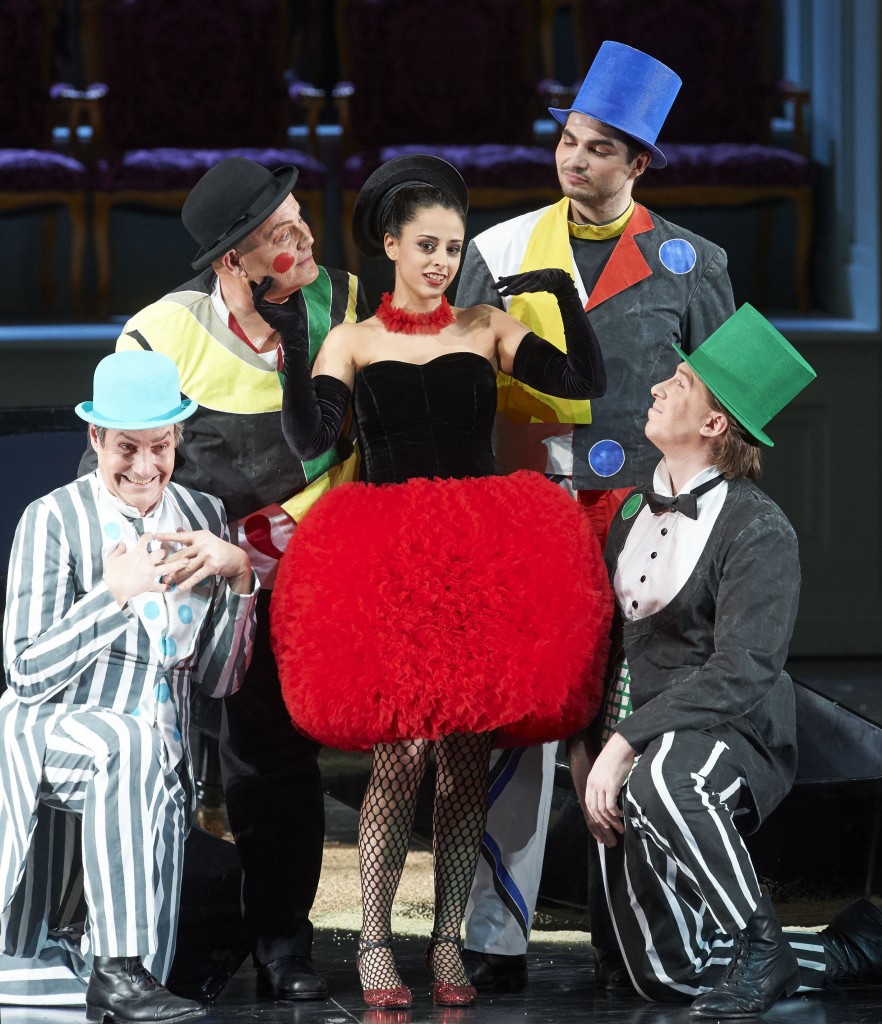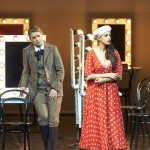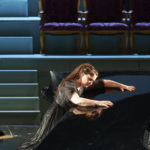 Richard Strauss’s Ariadne auf Naxos is an opera within an opera. It’s a comedy about putting on an opera, and the artistic compromises the composer faces to satisfy his patron, here ‘the wealthiest man in Vienna.’
Richard Strauss’s Ariadne auf Naxos is an opera within an opera. It’s a comedy about putting on an opera, and the artistic compromises the composer faces to satisfy his patron, here ‘the wealthiest man in Vienna.’
Vienna State Opera’s new (2012) production (Sven-Eric Bechtholf’s) is a triumph of good taste, and creative imagination. The magnificent sets (Rolf Glittenberg) befit a Viennese palace, where the opera is set. Richard Strauss’s opera premiered in 1916 Vienna, and the costumes are contemporaneous, or early 1920s.
It opens in an elegant state room, overlooked by the Composer (mezzo-soprano Sophie Koch) on piano. Koch, in a tweed three-piece suit and boots -a cross-dressed figure familiar in Strauss- is seen kneeling on the marble floor, sorting her score. Behind, huge French windows onto the garden, with curious guests arriving for the soiree. Koch sings of her first opera (Ariadne auf Naxos), a rarefied world of mythological gods: symbolic of the would-be creative genius’s alienation from the real world. It would ‘poison her soul forever’, be unthinkable, that anyone would want to change anything. Maybe ‘because the opera is boring’, it’s paired with an Italian farce.
Plush red velvet curtains are drawn back of stage. Brilliantly lit, white, theatre dressing-room chairs are now centre-stage. The dancers for the masquerade are a motley crew. Zerbinetta (Hila Fahima ) stands out in a bright-red polka-dot frock. The dance master (tenor Norbert Ernst) is identifiable, wearing a beret, camply dressed, in black matelot top, cravat, and two-tone spats. Behind the scenes there’s bickering amongst the cast. The internecine rivalries – much of it rapidly-fired spoken dialogue – is difficult to follow, even for a native German, (a lady from Hessen, sitting next to me.)
The stage, emptied, is dominated by an elderly man, the super-rich Viennese patron. Bald-headed, magisterial, the distinguished Austrian actor Peter Macic sits centre stage, commanding his universe. ‘The performances are to run not a minute over nine o’clock!’, the time he’s arranged for a fireworks display for his guests.
That the opera and masquerade have to be performed at the same time is just too much for Koch. It’s a humiliation for the composer’s first public performance, meant as ‘an authentic fulfilment of his artistic world-philosophy, Weltantanshauung.’ He withdraws. 
The confrontation of the two opposites, the earnest composer and the flighty, sexy cabaretiste/ chanteuse Zerbinetta, sparks, unexpectedly, drama and pathos. They fall in love in an Augenblick, love at first sight. Hila Fahima, a light soprano, is cute, bubbly, with a charming accent. Sophie Koch’s mezzo, richly calibrated, and at times intenesly moving, is the highlight for me (although Fahima’s comedy got more applause.) Their duet was something else, one of Strauss’s rarest and most beautiful. Ein Augenblick– a look says it all… She, Koch, appears cheerful; but she’s sad; appears sociable, but is lonely, (strains of Marshallin and Oktavian in Der Rosenkavalier.) Koch sings of fidelity, what she feels. Will they ever forget that look. They kiss; the piano tinkles away. Music is a holy art – the most holy of the arts- sings Koch, (probably Strauss’s sentiment.) But he accedes to the Herr’s wishes. The opera will be performed after all, with intervals of Italian comedians.
For the performance of the ‘opera’ there are tiered seats in plush red velvet, at the back of the stage, and facing us. This isn’t just artful: Strauss’s opera is self-reflexive, interrogating the very nature of opera. Turning his opera inside-out could almost be called ‘post-modern’.
Front of stage, the set is just weird. There’s a capsized piano; a black-lacquered coffin, upturned, the lid opened. Three ladies appear in plumed, feather boa, hats, flowing dresses, brightly coloured. They help the sleeping Ariadne (Gun-Brit Barkmin), in black and silver gown, to her feet. They take her by the hand, as she finds the first steps ‘back to life’. Strauss’s music, on sparse strings, is ineffably beautiful- heavenly, bewitching.
 Gun-Brit Barkmin is expressive, moving, a quintessentially Straussian soprano. To string accompaniment, and mournful, exceptional, horn playing, Ariadne sings, she wants to forget, (she was abandoned to Theseus in the mythology.) She must find herself again, the girl she was. Ariadne? Not she. Poignantly, she covers her head in a black veil. Wo war ich? Tod? And not quite alive. Und ist doch kein Leben.
Gun-Brit Barkmin is expressive, moving, a quintessentially Straussian soprano. To string accompaniment, and mournful, exceptional, horn playing, Ariadne sings, she wants to forget, (she was abandoned to Theseus in the mythology.) She must find herself again, the girl she was. Ariadne? Not she. Poignantly, she covers her head in a black veil. Wo war ich? Tod? And not quite alive. Und ist doch kein Leben.
Send in the clowns! The opera buffo dancers have come to cheer her up. One in a harlequin costume, another in boating blazer; another wearing a green top hat. They sing of something beautiful, of light and truth. They will free her. Clowns wheel up in their scooters, encircling her, to remind her Gibt es Tanzen ob Singen, of the joy of singing and dancing.
Zerbineta, Fahima in a black top, and bulbous red midriff- surreal, like a bunny girl. She must talk to her about her weaknesses. Her aria brazenly advises Ariadne not to shed a tear for her former lover, and to open herself to new love. Fahima is flighty, a deliciously light soprano- a good foil to Barkmin’s moody musing. Leben muss du , she sings. (One of the troupe, a handsome young baritone, flirts with her.)
The composer Koch stands, ghost-like, listening to the realisation of his life’s work; and as if to encourage (and prompt) Zerbinetta, in her never-ending aria, who fluffs her lines. Zerbinetta, a bundle of energy, slides down the upturned coffin, as if it were a roller-coaster. Both the audiences, behind her and in house, applauded enthusiastically. I found her exquisite, but -sorry, does she go on, and on… But where is she, asks one of the dancers. In a colourful umbrella dance routine, she’s then seen with some dishy cavalier.
“A boat is coming now…A radiant youth is seen approaching: it is Bacchus, the god of eternal regeneration”, according to the programme notes. In the legend, he’s escaped from Circe.
But Herbert Lippert, in dark grey coat, middle-aged, is surely no youthful Bacchus. Even though Lippert, with a sexy tan, has had a make-over. She greets him, the Bote, thinking he’s the Messenger for the god of death. He sings, ‘You beautiful deity, are you the goddess of this island; these your servants?’ She at first doesn’t know what he’s talking about. Tone, süsse Stimme. They’re bewitched. Transformed, as if reborn, ‘mystically united’. Barkmin’s Ariadne and Lippert’s Bacchus are well sung, but they’re not transcendental. Lacking the passion, and vocal power, to transport them heaven bound. (Titian got it right , in his Bacchus and Ariadne painting, showing the dashing youth descending from heaven in his chariot, with an exotic entourage of misfits, sweeping up the awe-struck damsel in distress.)
Meanwhile, at Vienna State Opera, the Orchestra, under the youthful Cornelius Meister, excelled. Sven -Eric Bechtholf’s production of Ariadne auf Naxos is masterful, the sets drop-dead magnificent. I can’t wait to be back, next time maybe, to be swept away. P.R. 12.03. 2016 ©
Photos: Peter Jelosits, Wolgang Bankl, Hila Fahima, Manuel Walser, Joseph Dennis; Sophie Koch (the Composer) and Hila Fahima (Zerbinetta); Gun-Brit Barkmin (Ariadne). Featured image Gun-Brit Barkmin
© Wiener-Staatsoper/ Michael Pöhn
viennaoperareview.com
Vienna's English opera blog
